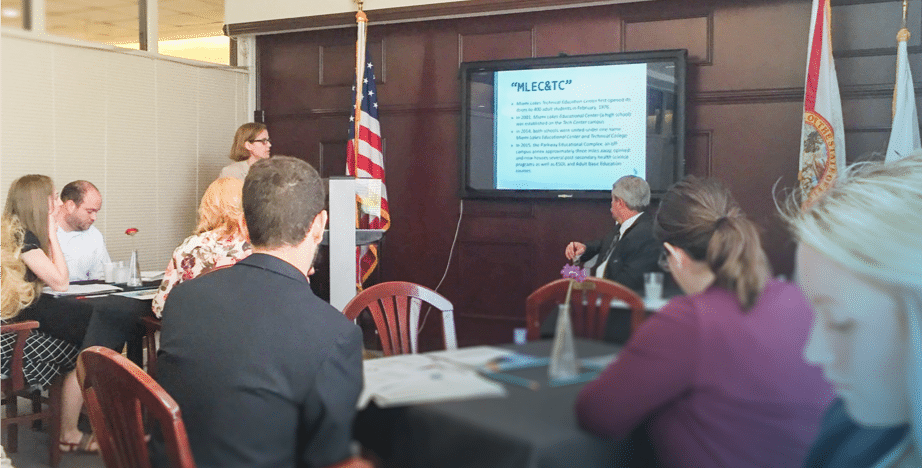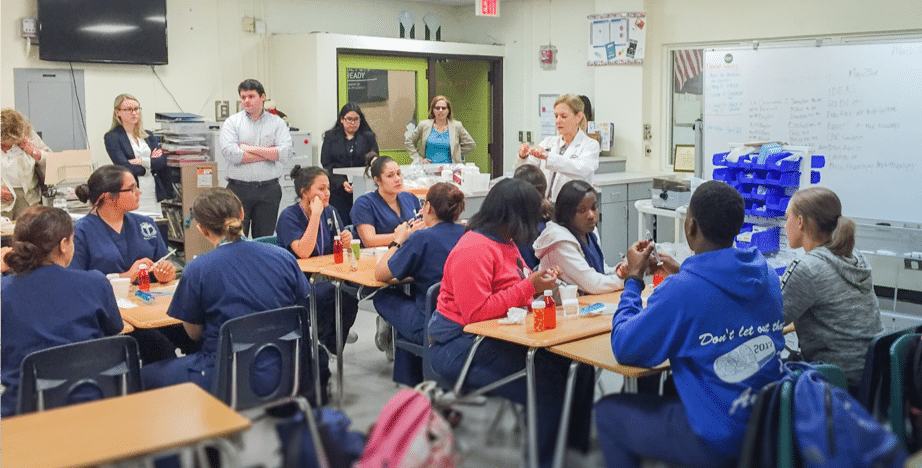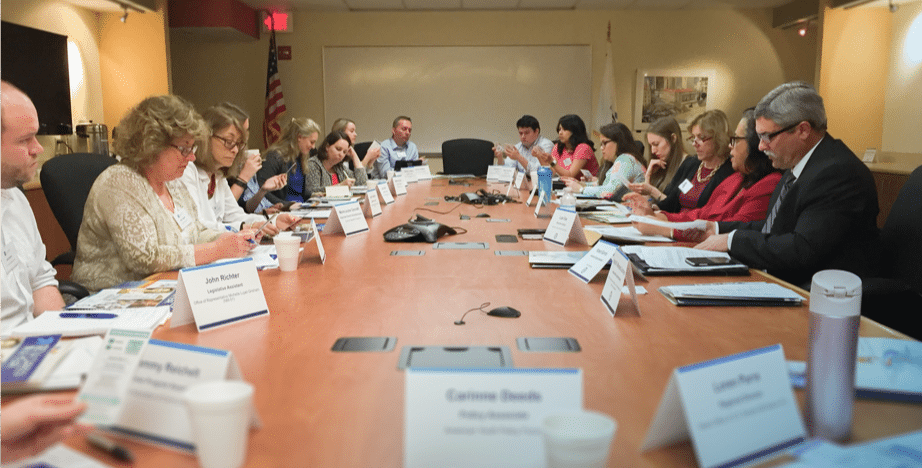Overview
This forum examined the important role of community colleges in increasing the number of Americans with postsecondary degrees and providing workers with the advanced training necessary to meet the needs of employers. The event highlighted community colleges that are effectively addressing the challenge of developmental education, removing other barriers to persistence, and providing a system of supports to help today’s diverse learners progress to degree completion. Panelists offered implications for scaling up the essential elements of these research-supported practices through federal and state policy. Speakers included Frank Chong, Deputy Assistant Secretary for Community Colleges, Office of Vocational and Adult Education, U.S. Department of Education (Washington, DC); Peter Adams, Project Director, Accelerated Learning Program at the Community College of Baltimore County (MD); and Elaine Baker, Director of Workforce Initiatives, Community College of Denver (CO).
PRESENTERS:
 Frank Chong began his duties as Deputy Assistant Secretary for Community Colleges in the U.S. Department of Education, Office of Vocational and Adult Education, in January, 2010. Prior to coming to Washington, D.C., Dr. Chong served as president of Laney College, the flagship of the Peralta Community College District in Oakland CA. At Laney, Dr. Chong oversaw a comprehensive renovation of college facilities and dramatically expanded community partnerships and entrepreneurial opportunities. Under his leadership, Laney College received a full accreditation and clean bill of health from the Accrediting Commission for Community and Junior Colleges, one of only five California Community Colleges to be so recognized in 2009.Chong’s professional experience spans every level of education, from cradle to career. Prior to assuming the Laney College presidency, he served as president of Mission College in Santa Clara CA and Dean of Student Affairs at City College of San Francisco. He was an appointed member of the San Francisco Children and Families Commission, and was elected to the San Francisco Board of Education in 1998. From 1987 to 1991, he served as special assistant to Willie L. Brown, Jr., the Speaker of the California State Assembly.
Frank Chong began his duties as Deputy Assistant Secretary for Community Colleges in the U.S. Department of Education, Office of Vocational and Adult Education, in January, 2010. Prior to coming to Washington, D.C., Dr. Chong served as president of Laney College, the flagship of the Peralta Community College District in Oakland CA. At Laney, Dr. Chong oversaw a comprehensive renovation of college facilities and dramatically expanded community partnerships and entrepreneurial opportunities. Under his leadership, Laney College received a full accreditation and clean bill of health from the Accrediting Commission for Community and Junior Colleges, one of only five California Community Colleges to be so recognized in 2009.Chong’s professional experience spans every level of education, from cradle to career. Prior to assuming the Laney College presidency, he served as president of Mission College in Santa Clara CA and Dean of Student Affairs at City College of San Francisco. He was an appointed member of the San Francisco Children and Families Commission, and was elected to the San Francisco Board of Education in 1998. From 1987 to 1991, he served as special assistant to Willie L. Brown, Jr., the Speaker of the California State Assembly.
Dr. Chong has served on numerous boards focused on higher education, including the Chief Executive Officers Board of the California Community Colleges and the American Council on Education Commission on Advancement of Racial and Ethnic Equity. He is the former president and founding member of Asian Pacific Americans in Higher Education (APAHE), a national advocacy organization.
Chong received a B.A. degree in Social Welfare and Asian American Studies from the University of California, Berkeley and a Masters degree in Public Administration from the John F. Kennedy School of Government at Harvard University. He also completed the Institute of Educational Management at Harvard’s Graduate School of Education, and earned his Doctorate in Educational Administration, Leadership and Technology from Dowling College in Oakdale, NY.
 Elaine DeLott Baker is Senior Counsel to the Vice President for Community Outreach at the Community College of Denver (CCD) and Director of CCD’s accelerated remediation programs, FastStart@CCD and College Connection. Baker designed and directed the projects during her tenure as Principal Investigator for the Colorado Lumina Initiative for Performance and as Project Director for Breaking Through and Scaling Up, joint projects of the National Counsel for Workforce Education and Jobs for the Future. In 2008 she designed and directed the Colorado Community College System’s “Ready for College” initiative, funded by the US Department of Education, Office of Vocational and Adult Education (OVAE). Her work in career pathways includes the development of the Essential Skills Program, a short term certificate program for TANF clients transitioning from assistance to work, which was awarded the American Association of Community Colleges and the US Department of Labor’s 2001 workforce development award.
Elaine DeLott Baker is Senior Counsel to the Vice President for Community Outreach at the Community College of Denver (CCD) and Director of CCD’s accelerated remediation programs, FastStart@CCD and College Connection. Baker designed and directed the projects during her tenure as Principal Investigator for the Colorado Lumina Initiative for Performance and as Project Director for Breaking Through and Scaling Up, joint projects of the National Counsel for Workforce Education and Jobs for the Future. In 2008 she designed and directed the Colorado Community College System’s “Ready for College” initiative, funded by the US Department of Education, Office of Vocational and Adult Education (OVAE). Her work in career pathways includes the development of the Essential Skills Program, a short term certificate program for TANF clients transitioning from assistance to work, which was awarded the American Association of Community Colleges and the US Department of Labor’s 2001 workforce development award.
Baker’s interests center on the successful transition of low-skilled youth and adults to post-secondary education and training and the interplay of policy and practice in post-secondary reform. Her recent publications include the 2008 Technology Solutions for Developmental Math, with Rhonda Epper, commissioned by the Bill and Melinda Gates Foundation; the 2009 Calculating the Productivity of Innovation, with Kristin Korash, funded by the Ford Foundation; and the 2009 Contextual Teaching and Learning, co-authored by Kelly Karandjeff and Laura Hope, published by the Research and Planning (RP) Group and Academic Senate of the California Community College system. Baker serves on the advisory board of the National College Transition Network and consults with foundations, intermediaries and public interest groups on issues related to post-secondary success. She is an alumna of Harvard University, the University of Massachusetts at Amherst and the University of Colorado at Denver.
 Peter Adams is Professor of English and Director of the Accelerated Learning Project at Community College of Baltimore County. Educated at the United States Military Academy at West Point and the University of Massachusetts, Amherst, Professor Adams has taught at the Community College of Baltimore County (CCBC) for more than 30 years. Over the years, his responsibilities at CCBC have included coordination of the writing program, chairing the college’s committee on general education, and chairing the English Department. He currently directs the Accelerated Learning Project, an innovative program that has doubled the success rate for students placed in developmental writing at CCBC.
Peter Adams is Professor of English and Director of the Accelerated Learning Project at Community College of Baltimore County. Educated at the United States Military Academy at West Point and the University of Massachusetts, Amherst, Professor Adams has taught at the Community College of Baltimore County (CCBC) for more than 30 years. Over the years, his responsibilities at CCBC have included coordination of the writing program, chairing the college’s committee on general education, and chairing the English Department. He currently directs the Accelerated Learning Project, an innovative program that has doubled the success rate for students placed in developmental writing at CCBC.
His professional experience includes tenures with the editorial board of the Journal of Basic Writing and leadership positions with the Conference on College Composition and Communication (CCCC), such as chairing the Conference on Basic Writing (CBW) for three years. His publications include the 1994 HarperCollins Concise Handbook for Writers and Connections: A Guide to the Basics of Writing, a Little, Brown text on grammar and punctuation for developmental writers. His article “Basic Writing Revisited,” appearing in the Journal of Basic Writing in 1993, has had a major influence on the movement toward mainstreaming basic writers. His “The Accelerated Learning Program: Throwing Open the Gates” appears in the fall 2009 issue of the Journal of Basic Writing.





